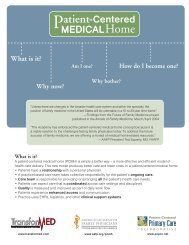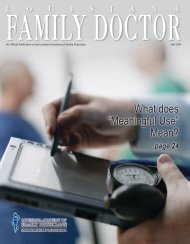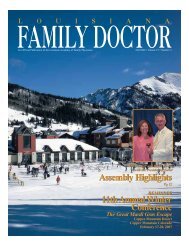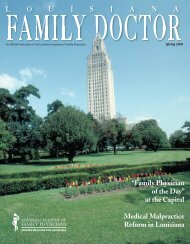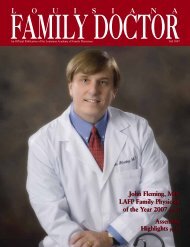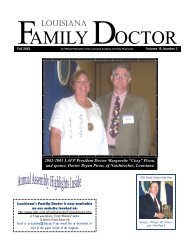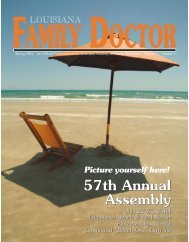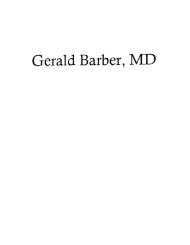amily octor - Louisiana Academy of Family Physicians
amily octor - Louisiana Academy of Family Physicians
amily octor - Louisiana Academy of Family Physicians
You also want an ePaper? Increase the reach of your titles
YUMPU automatically turns print PDFs into web optimized ePapers that Google loves.
G U E S T A R T I C L E<br />
Missing M.D.s<br />
Wanted: more geriatricians to treat the aging<br />
By ANDREW GOLDSTEIN<br />
Stephen Bzdok began experiencing seizures<br />
at age 65, and d<strong>octor</strong> after d<strong>octor</strong> was unable<br />
to discover the cause. A Las Vegas lounge<br />
singer for more than 20 years, Bzdok nearly<br />
became homebound. The internists and neurologists<br />
he saw never took the time — and<br />
didn’t have the expertise — to figure out what<br />
was wrong. Then an especially fierce seizure<br />
put Bzdok in a coma for four months. His<br />
f<strong>amily</strong>, assuming the worst, sold most <strong>of</strong> his<br />
possessions. One day, miraculously, Bzdok<br />
woke up. This time he consulted a geriatrician<br />
— a d<strong>octor</strong> with special training in care<br />
for the elderly — who soon discovered the<br />
problem: a heart murmur. Bzdok had a pacemaker<br />
implanted, and has been seizure free<br />
ever since. The fun-loving sexagenarian says<br />
he feels as if he were 50 again. He lives on<br />
his own, walks half a mile a day and spends<br />
weekends on a speedboat.<br />
If only the rest <strong>of</strong> the nation’s seniors were as<br />
lucky. When politicians and journalists talk<br />
about problems in elder care, they usually<br />
point to horrific abuse in nursing homes or to<br />
retirees who are forced to skip meals to pay<br />
for prescription drugs. But the most serious<br />
crisis in elder care has been largely ignored:<br />
not enough d<strong>octor</strong>s who know how<br />
to diagnose and treat aging’s special ailments.<br />
Out <strong>of</strong> 650,000 physicians in the U.S.<br />
today, just 9,000 are certified in geriatric<br />
medicine. And that number is shrinking, as<br />
many quit the poorly paid field or retire. Only<br />
3 out <strong>of</strong> 144 U.S. medical schools have a<br />
full department in geriatrics (all have a<br />
department in pediatrics), and fewer than 3%<br />
<strong>of</strong> medical students take even one course in<br />
geriatrics, according to the International Longevity<br />
Center. During the next 30 years,<br />
more than 70 million baby boomers will<br />
reach age 65. Who will care for them<br />
Medicine for the elderly is a different science<br />
from medicine for the young or the middleaged.<br />
Seniors face a range <strong>of</strong> age-related<br />
ailments — dementia, Alzheimer's, arthritis —<br />
and typically swallow more than four medications<br />
a day. A d<strong>octor</strong>’s attention to how drugs<br />
interact can mean the difference between<br />
saving a life and taking one. Many geriatricians<br />
say they devote much <strong>of</strong> their efforts to<br />
sorting out the complications caused by their<br />
patients' previous d<strong>octor</strong>s. Each year 17% <strong>of</strong><br />
elderly Americans are hospitalized after experiencing<br />
a dangerous drug interaction or<br />
taking incorrect dosages. The American<br />
Medical Association says nearly 7 million<br />
seniors a year are routinely prescribed drugs<br />
that are too risky for them.<br />
Mary Richert, 79, <strong>of</strong> Jennings, La., had been<br />
living on her own, taking trips as far away as<br />
Alaska, until she began suffering from memory<br />
and balance problems. She stopped driving<br />
and traveling and became depressed. At<br />
the urging <strong>of</strong> her children, she spent 18<br />
months trying to find a d<strong>octor</strong> who could help<br />
her. But the message from the series <strong>of</strong> internists,<br />
urologists, neuropsychologists and<br />
neurologists she saw was always the same:<br />
“Mama's problems are because Mama’s getting<br />
older.”<br />
That wasn’t the reason. Two years ago,<br />
Richert went to see Charles Cefalu, one <strong>of</strong><br />
the top geriatric specialists in the U.S. “He<br />
was different from any d<strong>octor</strong> I had been to,”<br />
says Richert. “He took his time.” Cefalu’s<br />
thorough examination helped him figure out<br />
the cause <strong>of</strong> Richert’s seeming dementia: her<br />
brain — like that <strong>of</strong> a child born with “water<br />
on the brain”--had stopped draining cerebral<br />
fluid. Cefalu sent Richert to a neurosurgeon,<br />
who placed a shunt inside her brain to act as<br />
a drain. Her health improved dramatically.<br />
Today she gardens, travels and — to the<br />
consternation <strong>of</strong> her children — is driving<br />
again.<br />
It’s an inspirational tale, yet what saved<br />
Richert is what keeps d<strong>octor</strong>s away from<br />
geriatrics: it takes time to diagnose elders’<br />
problems. A physician is reimbursed by insurers<br />
for a typical <strong>of</strong>fice visit <strong>of</strong> 15 or 20 minutes.<br />
But a geriatrician needs on average at<br />
least an hour for an initial assessment. While<br />
a general internist can see 2,000 to 3,000<br />
patients a year, a geriatrician sees fewer than<br />
500 patients, making for a smaller income.<br />
Says Joseph Ouslander, head <strong>of</strong> Emory University’s<br />
geriatric-medicine program: “I can<br />
go into my clinic and spend an hour with a<br />
very complicated 90-year-old patient, identify<br />
her 10 medical problems, sort out her dozen<br />
medications, talk to her children. And I get<br />
the same reimbursement as the dermatologist<br />
who spends 30 seconds shaving <strong>of</strong>f a<br />
mole.”<br />
A geriatrician’s income is almost entirely dependent<br />
on the amount that Medicare pays<br />
for each patient, in effect leaving the d<strong>octor</strong>’s<br />
salary up to the Federal Government. And<br />
this year Congress has cut Medicare reimbursements<br />
5.4%. <strong>Louisiana</strong> Senator John<br />
Breaux, who chairs the Senate Aging Committee,<br />
is one <strong>of</strong> the few members <strong>of</strong> Congress<br />
to call attention to the shortages in<br />
elder care, most recently at a hearing last<br />
February. Yet Breaux, a fiscal conservative,<br />
told TIME he won’t consider raising Medicare<br />
reimbursement rates. “That’s not in the cards<br />
right now,” he says. Instead, he proposes<br />
forgiving student loans to d<strong>octor</strong>s who go into<br />
geriatric medicine.<br />
A handful <strong>of</strong> medical schools have begun to<br />
boost their geriatric programs, despite the<br />
lack <strong>of</strong> student demand. (One medical resident<br />
said he never took a class in geriatrics<br />
because “old people are gross.”) Cefalu<br />
started an expansive program at <strong>Louisiana</strong><br />
State University that he hopes will act<br />
as a model for other schools. But when<br />
Greg Sachs, chief <strong>of</strong> geriatrics at the University<br />
<strong>of</strong> Chicago, launched a geriatrics fellowship<br />
in 1986, only a few young d<strong>octor</strong>s entered<br />
the two-year program, in fits and starts,<br />
and interest dried up altogether in the mid-<br />
’90s. This year Sachs has just a single fellow.<br />
When the legions <strong>of</strong> baby boomers begin to<br />
retire, many will need the kind <strong>of</strong> geriatricians<br />
who have the skills to save people like Bzdok<br />
and Richert. Jennifer Moore, 30, hopes to be<br />
such a d<strong>octor</strong>. Inspired to go into geriatrics by<br />
watching her grandmother take care <strong>of</strong> her<br />
grandfather after he suffered several strokes,<br />
Moore followed med school with a two-year<br />
fellowship in geriatrics. But now she’s having<br />
trouble finding a satisfying job. “How can I<br />
provide good care in the manner in which I<br />
was trained,” she asks, “when all I get is 10<br />
minutes with each patient” Unwilling to compromise<br />
her standards, Moore is looking to<br />
teach geriatric medicine instead. Now the<br />
question is whether she can find some students.<br />
— With reporting by Alice Jackson Baughn/<br />
<strong>Louisiana</strong>, Paul Cuadros/Durham, Deborah<br />
Fowler/Houston, Kathie Klarreich/Miami, Greg<br />
Land/Atlanta, Jeanne McDowell/Los Angeles and<br />
Maggie Sieger/Chicago<br />
From the Nov. 11, 2002 issue <strong>of</strong> TIME magazine.<br />
http://www.time.com/time/magazine/<br />
article/0,9171,1101021111-386949-2,00.html<br />
25




